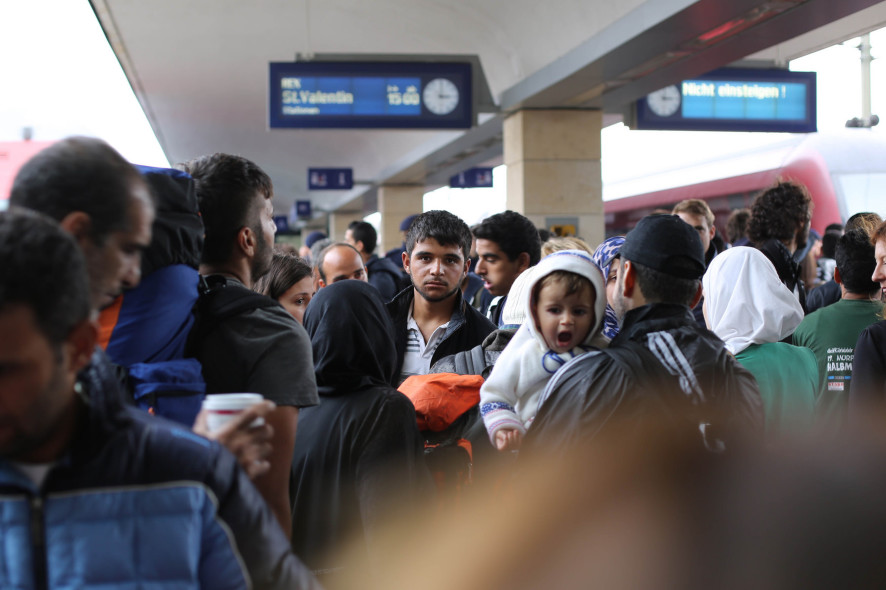by Arne Langlet
As it becomes ever more apparent that the current handlings of the crisis is unsustainable, policy makers are by now finally agreeing that is it the so called “root-causes” of the crisis that be tackled to in order to control and stop the flow. If the EU wants to succeed in fighting the current crisis, it has to implement changes now. Both, the creation of better legal entrance possibilities for refugees, as well as a the introduction of “European value codex” would be crucial steps on this way.
Violent incidents in refugee camps have started to occur more regularly, with reports of refugees discriminating, threatening and fighting other ethnic or religious groups increasing. How is it surprising that a bunch of men in their twenties, crowded together without chance to work, without clear legal status bored to death after a journey where they had to bite their way through, become violent?
In these situations, religion is a strong tool to regain dignity, and thus it is no wonder that it plays an important role in many of the incidents. Yet, Europe must make clear that no kinds of violence – especially along ethnic, sexual or religious lines – can be accepted.
Although the ratio of violent incidents may be very small, it managed to create a real feeling of fear among many European communities – and this fear, even if mostly unfounded, must be taken seriously. Not least because these emotions have increasingly bigger political effects.
If one wants to ease the public tensions with regards to refugees, declaring such fears as “ridiculous” does not help, but merely pushes those people into the arms of populists to claim to care. Instead, those fears have to be met in a constructive and comprehensible way.
The Syrian war has been going on since 2011. For four years relatively few refugees arrived, while most stayed in refugee camps around Syria, where each year the food was becoming scarce while the hygiene worsened. This shows that the act of traveling clandestinely from camps in Lebanon, Jordan or Turkey to central Europe is certainly not a comfortable and easy decision for most, but rather a last resort. It is taken only once the hope of a return to their homelands is destroyed.
As the journey is expensive and dangerous (also due to corrupt politicians on the Balkan), it also applies a clear Darwinian selection. Syrians without financial resources are almost sure not to get anywhere. Furthermore, 69 per cent of all arriving refugees are young men.The trip requires physical and emotional strength, it might include running for hours and resisting physically against police or other refugees. And here lies the big problem.
These men in their twenties learnt that you can only reach the destination illegally and if you have the money, the physical strength and possibly the ruthlessness to make the dangerous trip.
Hence, one of the first necessary changes would be to cut the element of the illegal journey, and to allow refugees to apply for asylum directly in their home country or in the refugee camps in the surrounding countries. With this measure, the EU could gain control again, and implement proper registration (ideally determining destination countries beforehand, according to a fair allocation key – but that’s a different discussion).
The EU is aiming at a similar direction by installing so called Hot-Spots, however only inside or directly at the EU’s borders. Yet, these spots would have to be as close as possible to Syria, to have the best effect.
Also the business of human-smugglers could be destroyed with this. Even though the proposed system would not give all applicants the immediate chance to enter the EU, it would foster the hope that doing so will be possible not only legally and cheaper, but also together with the whole family. This would ease the pressure of the flow and avoid new mass departures. Would you rather risk everyone’s live and all your savings now, or wait another few months or even a year to get to Europe legally? In the end, this would also buy Europe time to solve the real root causes!
Secondly, refugees could be obliged to sign a “codex” upon entering the EU, binding them to European basic values. It might be naive to assume that everybody would strictly adhere to the principles, but still a moral burden to adhere to them would be created, serving as a constant reminder. Furthermore, the alleged problem of refugees not knowing the local rules beforehand would be solved.
While the current system shows them that only illegal actions are rewarded, this could teach them that acting according to the legal system is rewarded instead. While some might argue that this would mean forcing “our” norms on them, it should be clear that respecting the very basic values of European society can be expected of all those who arrive. Everyone who enters this society is aware of this, and there is also no alternative.
The content of this codex would represent the basic European values of diversity, tolerance, and equality of all ethnicities and religions – thus also creating an interesting public debate to truly determine and codify what we perceive as common European values. This would increase awareness and foster European identity.
The proposed measures will not automatically solve the situation but could buy us time to solve the real root causes, while facilitating the job of social workers on the municipal levels.
Image by Josh Zakary, taken from flickr




